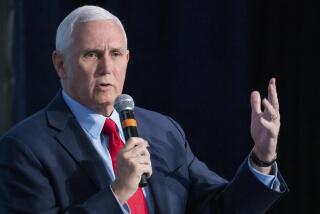CIA Director Told to Testify in George Trial
- Share via
WASHINGTON — A federal judge Tuesday ordered CIA Director Robert M. Gates to testify for the defense at the perjury and obstruction trial of former CIA spy chief Clair E. George, declaring: “Mr. Gates is up to his eyeballs in his knowledge of this subject.”
Justice Department lawyers had argued on behalf of the CIA that there was no “sound basis” for subpoenaing Gates. But U.S. District Judge Royce C. Lamberth disagreed, saying that “what Mr. Gates knew can be very critical to Mr. George’s defense.”
Lamberth took issue with Justice Department attorney David J. Anderson’s contention that Gates had not attended CIA meetings where George allegedly learned key details of secret efforts to support the Nicaraguan Contras--knowledge George later denied to Congress.
A number of witnesses at George’s trial, where the prosecution wrapped up its case Tuesday, testified that Gates was present at some of the meetings, Lamberth noted at a hearing after the trial ended for the day.
“The problem is that there were only two people above Mr. George, and one is dead,” the judge said, referring to former CIA Director William J. Casey, under whom Gates served as deputy and George as deputy director for operations.
Gates’ contention at his Senate confirmation hearings that Alan D. Fiers, the chief prosecution witness against George, never discussed with him former White House aide Oliver L. North’s work for the Contras could buttress George’s claim that Fiers did not tell him either, defense attorney Gordon Coffee argued at the hearing. Fiers, a Casey protege, served as chief of the CIA’s Central American task force.
Lamberth’s ruling came after he rejected a defense motion for directed acquittal of the nine felony counts against George, and after George’s defense got off to a shaky start.
CIA official David Gries, who headed the agency’s congressional affairs office in 1986 when George allegedly lied and gave false statements to House and Senate panels, described the agency as in great disarray at the time as senior officials struggled to come up with explanations of the agency’s role in Iran-Contra.
“Compartmentation, (restricting information to only those who have a need to know) a way of life in the intelligence world, had become the enemy,” Gries said, hampering efforts to put together an accurate account. He noted that George’s testimony that he did not know for certain that “Max Gomez” was an alias for Felix Rodriguez, a key operator in the secret program to resupply the Contras, was followed up by a CIA effort to correct the record. But under cross-examination by chief prosecutor Craig A. Gillen, Gries conceded that this follow-up information did not include important details about Rodriguez’s role that were included in a briefing book that George carried with him to the Senate and House hearings.
More to Read
Sign up for Essential California
The most important California stories and recommendations in your inbox every morning.
You may occasionally receive promotional content from the Los Angeles Times.













